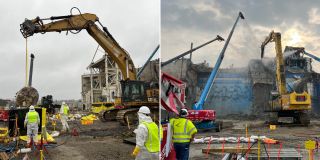Jimmy Carter: America’s first nuclear president

Craig Piercy
cpiercy@ans.org
James Earl Carter, the 39th president of the United States, passed away in Plains, Ga., on December 29. He was America’s first president formally trained in the applications of nuclear science and technology, and as such, knowing nothing else, one might imagine that he would be held in universally high regard by the U.S. nuclear community.
The reality is more, well . . . complicated.
A graduate of the U.S. Naval Academy, Carter was an early protégé of Rear Admiral Hyman Rickover. His operational experience included an assignment to restore a partially melted-down research reactor at the Chalk River Laboratory in Canada in 1952. The work plan had Carter and his men taking sequential 90-second turns cleaning and repairing the damaged reactor. Take a moment to imagine yourself in Carter’s booties: You are lowered into a highly radioactive environment, you move toward the reactor as fast as you can and remove a single bolt (per the plan you rehearsed multiple times in a replica of the reactor assembled on a tennis court outside), then you run—hoping for a quick, uneventful extraction.
Carter would later tell CNN, “We were fairly well instructed then on what nuclear power was, but for about six months after that, I had radioactivity in my urine. They let us get probably a thousand times more radiation than they would now. It was in the early stages, and they didn’t know.”
Although as president, Carter’s policies were generally supportive of nuclear power, he often described it as an energy source of “last resort.” Many in the nuclear community still criticize his 1977 decision to abandon nuclear fuel recycling as foolish and shortsighted. In hindsight, it had little if any positive impact on nonproliferation efforts and arguably weakened American influence by breaking the U.S. monopoly on the nuclear fuel supply. Yet I am inclined to give him the benefit of context. Carter’s action came less than three years after India conducted a “peaceful” nuclear explosion, seen by many at the time as the first domino in the unraveling of the international nonproliferation regime. In fact, his executive order merely formalized the position already taken by President Gerald Ford and included a commitment to “increase U.S. production capacity for enriched uranium to provide adequate and timely supply of nuclear fuels for domestic and foreign needs.”
Arguably, the shining nuclear moment in Carter’s presidency was his visit to Three Mile Island on April 1, 1979, a mere four days after the accident and partial meltdown of Unit 2. Carter’s presence at the damaged reactor helped soothe public fears, which had been fanned by clumsy initial PR as well as the rather inconvenient release of the film The China Syndrome just 12 days before. Less well appreciated is the fact that Carter pressed on with his tour despite being briefed on the risk of a hydrogen explosion, a concern that, while subsequently dismissed, was very real at the time.
Although the public’s opinion of nuclear energy sank to new lows in the wake of TMI, Carter remained supportive of nuclear, even in the face of harsh criticism from the environmental community.
Ultimately, Carter lost reelection to Ronald Reagan in 1980, and thus began the next chapter of his life as a volunteer and philanthropist. He won the Nobel Peace Prize in 2003.
In 2005, he toured the D. C. Cook nuclear power plant, where he told a group of employees, “I am very proud of what nuclear power has done for our nation’s security and well-being. I think the future holds great opportunities for nuclear power because safety has improved, technology has improved, and environmental quality has improved.”
Ultimately, President Carter deserves our respect and admiration. It was not an easy journey for him. After the dose he received at Chalk River, he was told that he would likely never have more children. But while he may not have been the full-throated nuclear advocate that many had hoped for, he never wavered in his basic support for the technology. Godspeed, President Carter. Thank you for your service to our nation.

